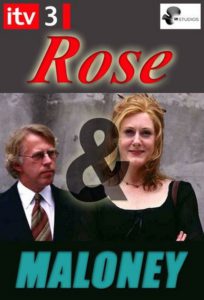Lockdown, Lowdown… Ringside Report Looks Back at Rose and Maloney
 By Donald “Braveheart” Stewart
By Donald “Braveheart” Stewart
There are times when you happen upon something you forgot long about. Just the other week I did just that.
Since her appearance in the soap Coronation Street, actor Sarah Lancashire has made a career out of playing women with bite and steel. She was a tad hapless in Coronation Street – or rather her character was as she vacillated from one crisis to another, but she was a great actor.
I enjoyed her appearances so much that I tended still to look out for her. So, her appearances as a social worker in Kiri, as a police officer in Happy Valley and as a concerned mother in The Accident drew me to each program because of her presence. In each I was not disappointed.
She manages to etch in granite, concern upon her features. Alongside that there is a flawed experience which says, I have lived, and this is where I lived it.
A few weeks ago, I was scanning a few of the usual places for any material I may have forgotten about when I came across Rose and Maloney.
Now to be honest it was not Lancashire that struck me at first but the actor Phil Davis who plays her boss in it. He is another who has not mad leading actor category, but his presence is often the key to a damn good drama.
Created by Brian Elsey, this was an ITV creation which ran over three series and 11 episodes, running from 2002 to 2005. In the series we got treated to Rose Linden, (Lancashire) and Marion Maloney (Davis) as investigators for the Criminal Justice Review Agency. It hit our screens just as the thought was forming in the UK, that we may have, towards the end of the Twentieth Century not been very good at the justice malarkey.
It hit the right spot.
A couple of dogged and determined people trying to find out of we got the wrong uns and put them in prison whilst the real bad uns were still out there managed to ride the crest of that wave. The heft which was brought by Davis and Lancashire was certainly an additional bonus. The creator Brian Elsley was adept at putting things in our pathway in his writing which made real characters jump form the screen to our psyche.
Rose was impetuous, impulsive, driven by an innate desire to seek justice. Maloney was more by the book and the odd couple they became saw the inferior officer, Rose, tend to drive her more conservative senior – Maloney.
The format was simple. Spread at first over two episodes we got the crime, the possibility of it being investigated dodgily and then the intrepid two got to it. Often it was Rose who sniffed out the implausibility but Maloney who gave the whole things some gravitas as his leg work and studious application to the facts of the case meant they had the combined flair and the evidence to win out.
There is certainly some criticism that Rose, who was slightly less than stable at the beginning, a diabetic with a voracious sexual appetite at times became more staid and sedate as the series moved from pilot to commissioned. It could nevertheless be claimed that some of Maloney rubbed off on her.
Given his search for love in the second and third series the reverse is easier to argue!
By the end of the third series the plot lines were a little less clear and it was easy to see why they would have decided to drop it though I do think it is a shame as these two characters had plenty still to give. Their careers were to take off – both of them – and if you want to see not where it all began but where a seminal period of their development is, in the UK you can get it on Amazon Prime but if you can’t get it there then all of the episodes are handily on YouTube!!
British television is a curious affair. Begun through the British Broadcasting Corporation (BBC) it is funded through the universal license fee. In essence, if you wanted to watch the television , you had to pay the license fee. The BBC got it all and is state run, albeit at arms-length. Then came along commercial television in the form of the Independent Television (ITV) in 1955. Designed to bring a bit of competition to the BBC, it was paid for through advertising but still free to air… well they didn’t add another license fee to it. By the time that I was born, 1965, there was BBC1, BBC2 and ITV. And that was it. It was still years before Bruce Springsteen would moan that there were 55 channels and nothing on but here in the UK, we kept this going until in 1982, we added a fourth channel and in 1997, a fifth. With sparkling imagination, they were called Channel Four and ehm Channel Five… In between came Sky and we understood what Springsteen meant. And so, my childhood and leading up to early adulthood we had three options… But the programs made were exceptionally good. And so, here is some critical nostalgia as the lockdown has brought a plethora of reruns, new formats and platforms and old classics trying to make their way back into our consciousness as broadcasters flood their schedules with classics… or are they classics at all? Let me take you through an armchair critics’ view of what we have to see, to find out… Welcome to the Lockdown Lowdown…
[si-contact-form form=’2′]

